12 Best Websites to Sell Stuff Online (2023)

[ad_1]
Before the advent of the internet and ecommerce, yard sales and newspapers were the only places where you could sell your stuff without owning a storefront. Now, with all of the different selling websites and apps available, anybody can make extra cash selling just about anything, without having to leave their house.
Online selling has completely changed the way we think about starting a business. And there’s a good reason why: 63% of shopping journeys start online, making online selling an increasingly lucrative option for aspiring young entrepreneurs.
Are you a hobbyist looking to sell kitchen equipment? Do you have a backstock of trendy jewelry? Have you got a connection to get a product at wholesale prices? Maybe you’re just looking to sell off that Beanie Babies collection? (Don’t lie, you’ve got one!) Or, perhaps you’re practicing feng shui and looking to declutter your living space or storage unit? If you’re still trying to figure out how to find winning products, check out Shopify’s Winning Products course.
No matter what your objective is or what you’re selling, there’s a sales channel out there that’s a perfect fit for you. We’ve done the research and compiled the best sites for you to sell your products online. As a bonus, we’ll also tell you the benefits of starting your own store, and how using both can help you make more online sales.
Let’s get started.



Create your own online store
Creating your own online store comes with its own challenges, but can also be extremely fulfilling and profitable if done right.
The biggest downside is that you have to market yourself and drum up your own traffic to your site. Essentially, you’re creating your own brand and that can take a little time.
The upside is that your profits are yours—there are no commissions, and you have complete control over your pricing strategy. Here’s the best platform you can use to create your very own online selling site:
Shopify

When it comes to creating your own website to sell your stuff, Shopify has got to be one of the easiest to use and most trusted. As of November 2022, more than four million sites were using Shopify to run their operations.
The basic Shopify fee is $29 per month. This includes your own website, blog, SSL certificates, abandoned shopping cart recovery, and social media sales channels, among many other tools and perks. There is no initial setup fee or other hidden fees, unless you choose to use a different payment gateway than what Shopify provides.
Shopify is an excellent platform to start selling online via your own site. It’s beginner-friendly, with excellent customer service. Plus, there are various Shopify apps you can use to customize your store, including wholesale marketplaces like Handshake. Here’s a guide you can use to launch your Shopify store in less than 30 minutes.
Top 12 websites for selling stuff online
The following are some of the most well-known online selling sites and can accommodate just about any item you might have.
1. Bonanza

This Seattle-based company is relatively new to the online marketplace scene, yet is doing remarkably well. With more than 50,000 sellers and 35 million different items, Bonanza is a large and growing community of online shops.
The fees for selling on Bonanza are relatively minimal and are based on what it calls the Final Offer Value. The Final Offer Value is the combined dollar value of what the buyer paid plus the portion of the shipping fee that exceeds $10.
So, if you sell an item for $20 then charge $12 for shipping, the Final Offer Value is $22. The selling fee is 2.5% of the Final Offer Value, so in this example, your fee would only be 77¢. If you sell items for more than $500, the same rules apply, but there is an additional 1.5% flat fee on any dollar amount over $500.
This online selling site works well for those that are not able to pay listing fees. Setting up a shop is easy, and you only pay fees if you make a sale.
2. Amazon

Amazon is a trusted go-to website that sells more than 400 products per minute. How is it able to sell that much so quickly? Well, people feel a sense of comfort and trust when buying from this site.
Amazon is known to verify sellers and keep counterfeit products out of its marketplace. And it’s earned people’s trust by delivering the items they want, on time. That’s why so many people consider it their go-to marketplace for online shopping. Such a large number of perks means your products are more likely to be sold, but it also means the site comes with more fees.
A professional selling account on Amazon requires an application process as well as a $39.99 monthly fee. There are also fees for each item sold. If you don’t plan on selling more than 40 items a month, you can get an individual seller account that requires no monthly fee. The individual seller account charges a 99¢ per item fee plus percentage fees on top of that, depending on the category in which your item is selling.
Amazon is great for those looking to move large quantities of products or need exposure to a larger audience.
3. eBay
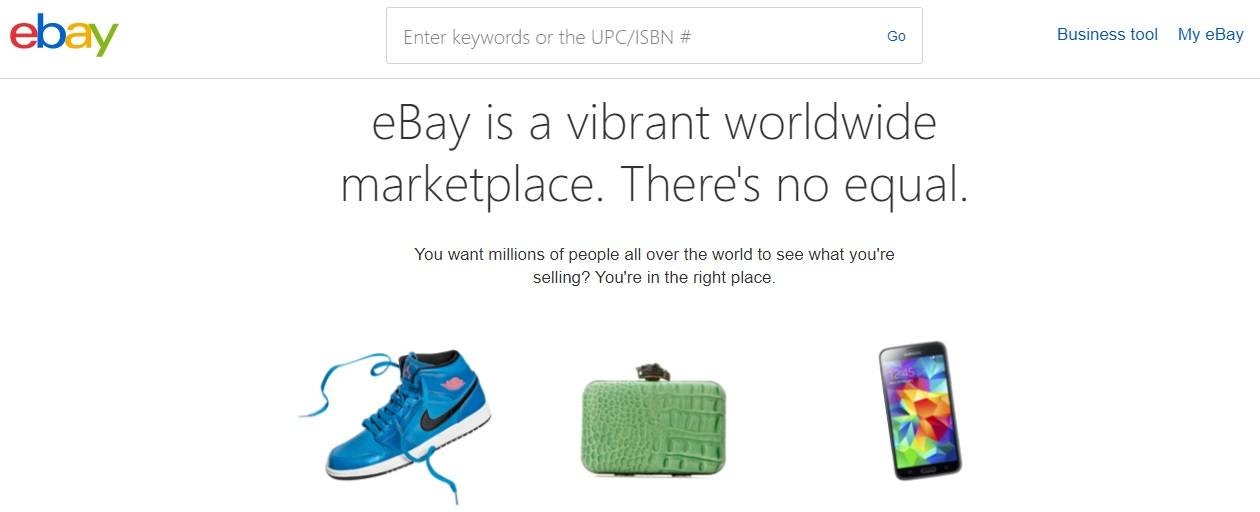
The original online selling platform, eBay has been on the web since 1995. There is almost nothing you can’t sell on this website. So if you’re looking to sell something antique, crafty, or a little weird, this might be the online selling site for you.
Be aware of the selling fees when selling on eBay. It charges a non-refundable fee to list an item and another “insertion” fee if you decide to list the same item in another category.
There’s also a “final value fee” that is a certain percentage (eBay says it’s 10% to 12% for most categories) of the price that your item sells for, plus a percentage of the shipping costs. These fees vary and are calculated based on what your product is, how many, and what types of categories it is listed in, as well as shipping.
According to 2021 eBay Statistics, eBay has over 1.7 billion listings and 135 million users, worldwide. Similar to Amazon, it’s an incredibly large buyer network. However, keep in mind that eBay as a brand is generally less trusted than Amazon.
4. VarageSale
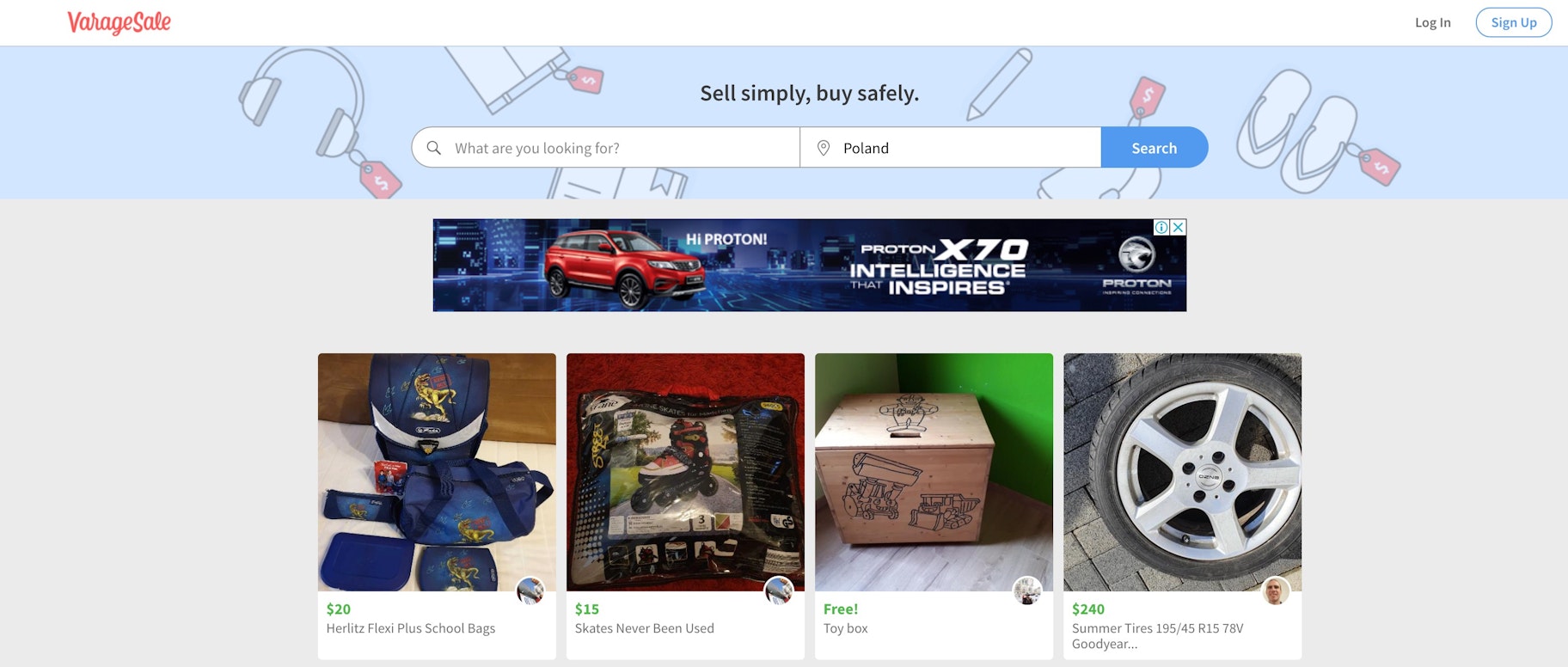
VarageSale is a Toronto-based online selling platform created by an ex-elementary-school teacher who grew frustrated with the scams and illegitimate listings on classified sites.
The site requires sellers to create a Facebook verified profile to ensure that merchants use a real profile image and name, along with a personal bio. This helps buyers feel comfortable doing transactions as they have a better idea of who they are dealing with.
VarageSale members can sell products online for free. As a seller, you can create a listing with a headline, description, and product photo. If someone is interested in making a purchase, they can reserve your item and plan an offline meetup for exchange, or use Stripe to make an online payment.
As of this writing, the platform isn’t charging a seller or transaction fee from merchants.
5. Handshake

Built and operated by Shopify, Handshake is a wholesale marketplace designed to bring suppliers and retailers together. Retailers can join Handshake whether they are brick-and-mortar or online (or both), and suppliers are handpicked by the Handshake team. If you sell unique, distinctive products under your own brand, you can apply to sell wholesale on the platform.
In addition to hosting a massive collection of unique, non-mass-produced products, Handshake stands apart from other online selling sites because of its integration with Shopify.
Shopify is the world’s leading ecommerce platform, which enables wholesale creators and retailers to manage inventory, track sales, and execute new orders from within the same ecommerce ecosystem they might be using already. This stands out in the world of wholesale marketplaces, which often require CSV uploads and other manual upkeep.
6. Ruby Lane

Probably the best online selling site and shopping forum for vintage and antiques, Ruby Lane was voted the number one recommended selling venue a few years back.
There’s no fee to set up a shop with Ruby Lane, and the platform doesn’t charge you for listings. However, you need to pay a $54 monthly maintenance fee for shops with 50 items or more. Additionally, RubyLane charges a 6.7% service fee on total purchase order (excluding sales tax).
This online selling site is designed to bring collecting enthusiasts together. If you are looking for a niche selling website for your antiques and collectibles, this is likely the site for you. Be mindful of the fees, though.
7. Etsy
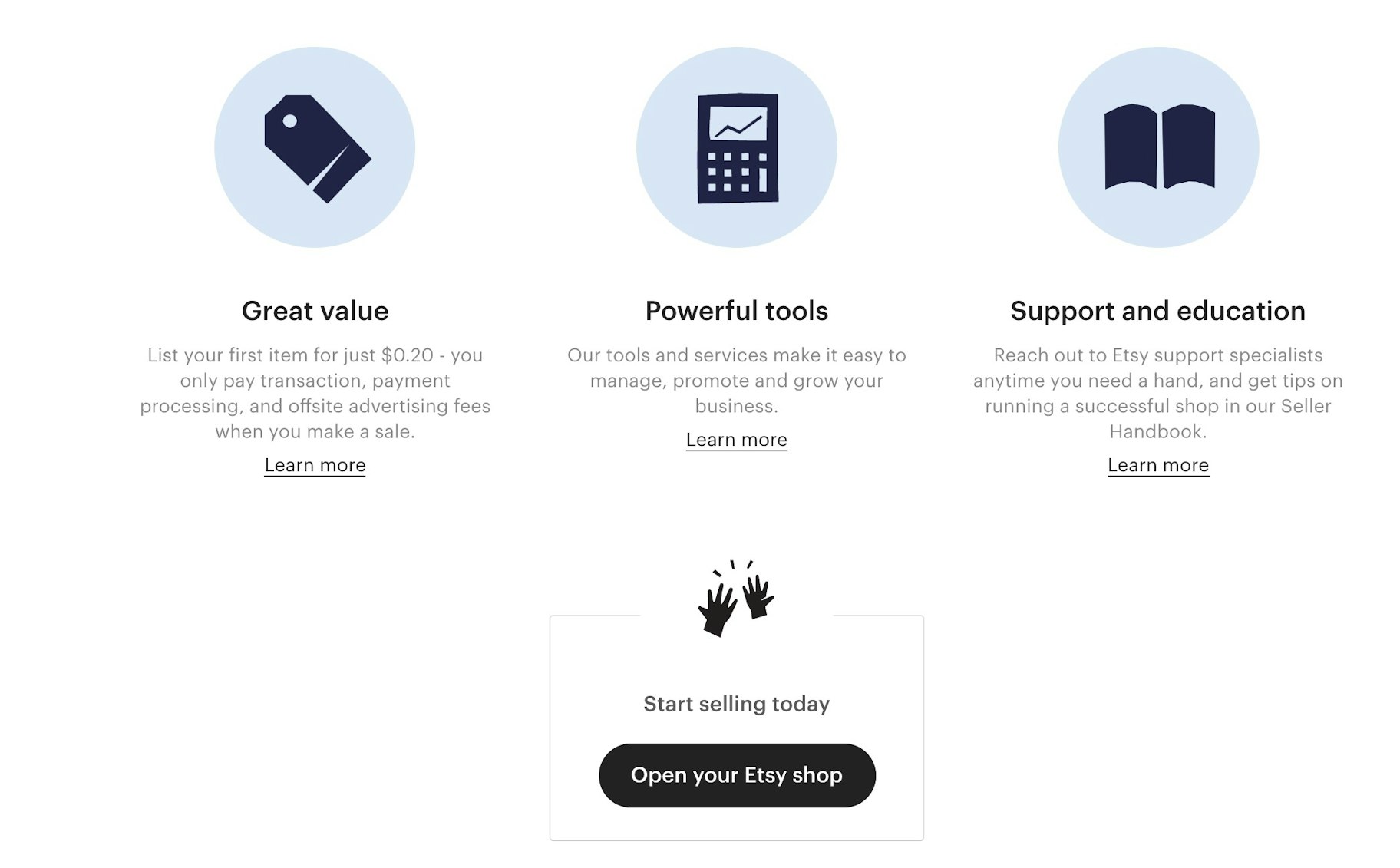
Much like Ruby Lane, Etsy caters to more of a niche market than that of eBay or Amazon. Here, you can sell your handmade goods, art, collectibles, and antiques. With annual sales in the billions, Etsy is considered to be a lucrative platform for online selling.
Etsy charges a 20¢ listing fee for each item. The item stays in your shop for four months or until it sells, whichever comes first. When you sell an item, there is a 5% transaction fee and a 3% plus 25¢ processing fee (this varies based on the location of the seller’s bank).
The transaction fees apply to just the listed price (not to sales tax) if you’re selling from Canada or the US. However, the platform will take 5% of the overall shipping charges should you decide to charge customers a separate shipping fee.
Etsy is well known and respected. Its ease of use and overall good standing in the online selling world make this site one of the best places to sell your stuff online.
8. Chairish
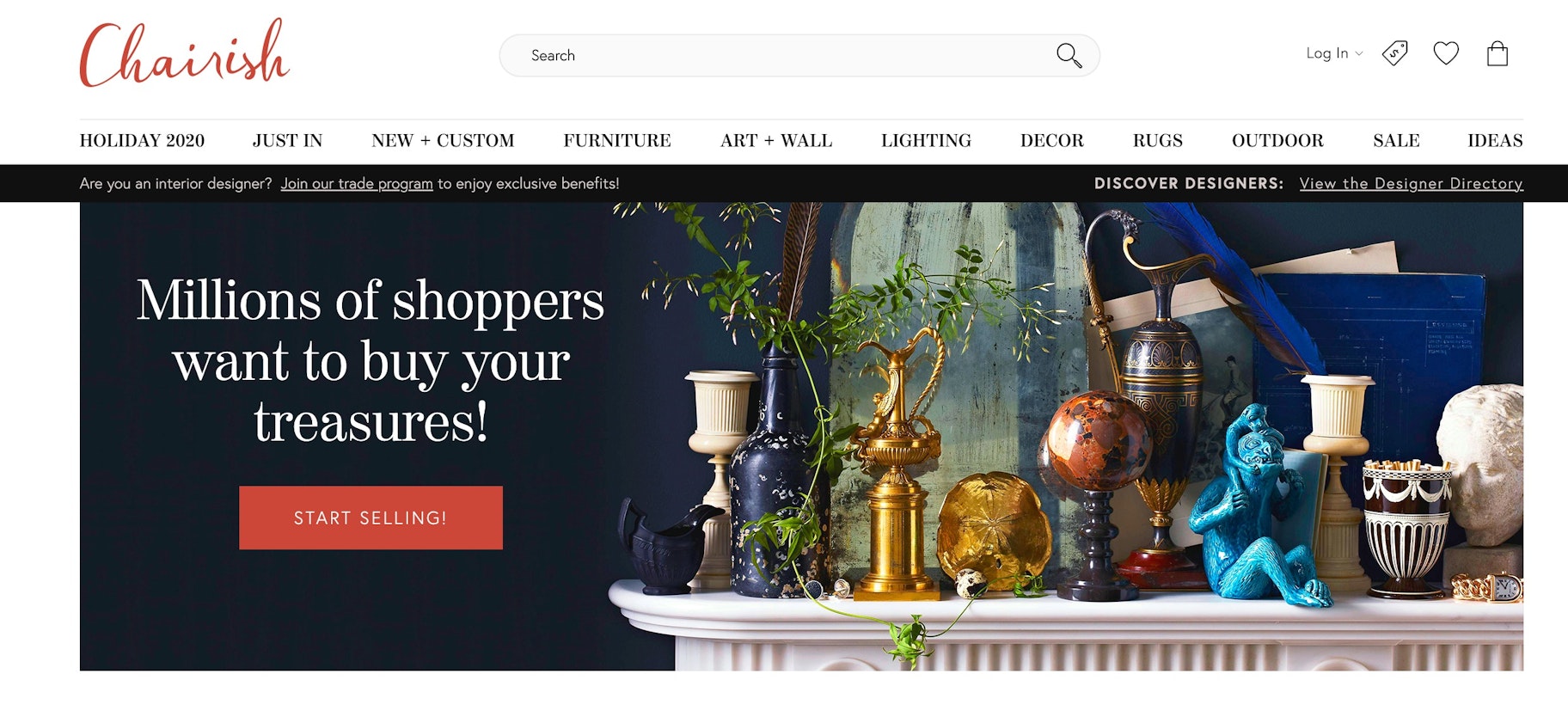
This growing online consignment store is geared specifically for high-quality furniture and home décor. Listing items is easy on Chairish, and like any consignment store, it takes a percentage of the selling price.
The percentage that Chairish keeps depends on how much your item sells for: 20% of the first $2,500, 12% of the next $22,500, and 3% of the next $15,000. In the example on its website, if you sell an item for $40,000, you get to keep $35,350.
The best part is that listing your items is completely free. You list your items, and the curators at Chairish review them to make sure they meet their standards. Then they touch up your provided photos and make the item available for purchase.
Chairish also takes care of the shipping logistics, so you don’t have to worry about shipping large pieces of furniture (just as you don’t when you engage in dropshipping). You can also arrange your own shipping if that suits you.
Chairish is a great online selling site for those that want to sell furniture and other home décor. It upholds high standards, which is ideal for buyers and collectors.
9. Swappa
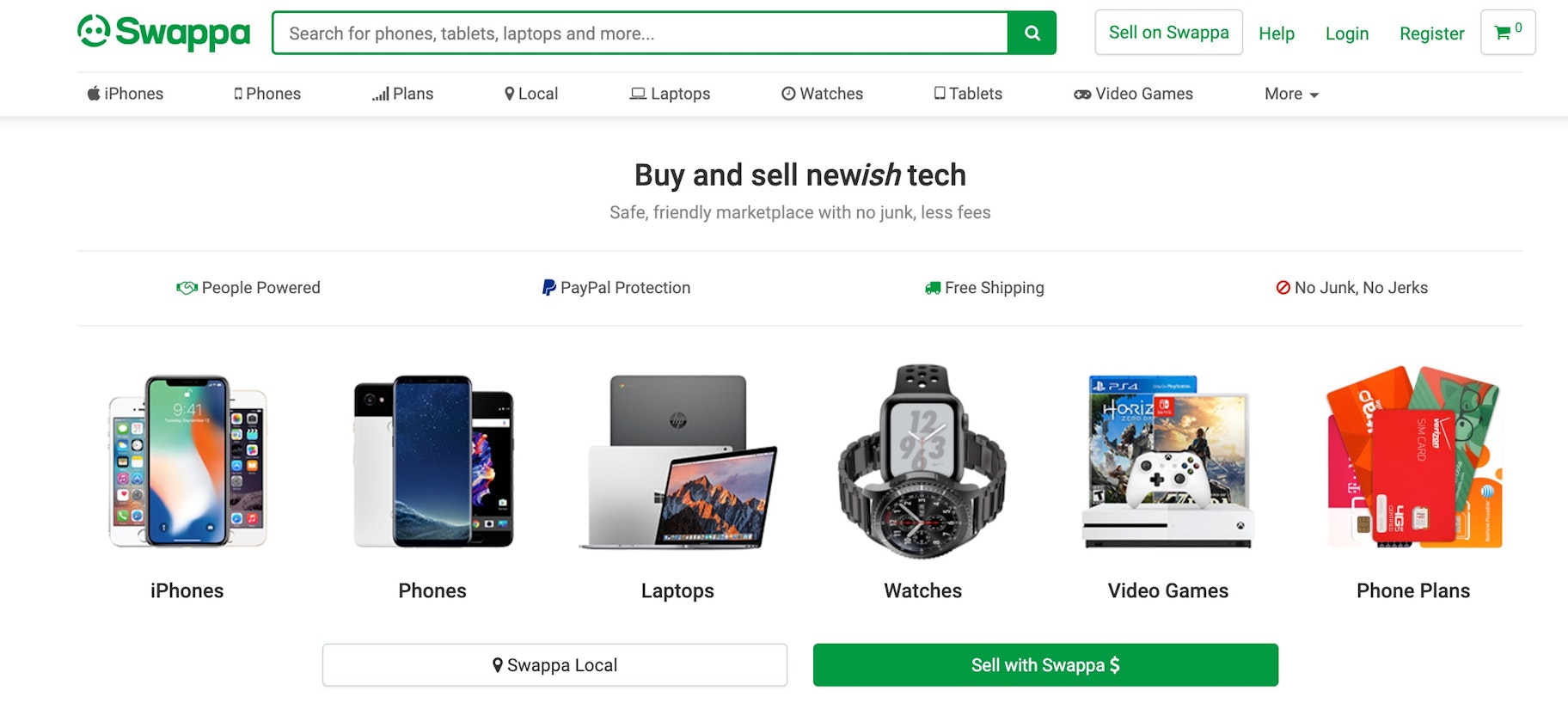
Do you have a smartphone that you no longer use? A camera lying around gathering dust in your drawer? Maybe you can consider turning them into cash since they don’t really have much utility for you.
Swappa is a marketplace to buy and sell tech gadgets. The team behind the platform have done a great job at weeding out the trolls and fraudsters, which has helped it gain an excellent reputation. Of course, this means they will thoroughly scrutinize your item, which won’t be a problem if you’re selling products in good working condition.
Swappa doesn’t charge seller fees to create listings. However, you can choose to get a listing featured for a $5 fee. Also, transactions on Swappa typically happen via PayPal, which charges a fee from sellers when buyers make a payment. Still, Swappa has one of the lowest fees amongst all the marketplaces on our list.
You can also choose to use Swappa Local, a version of the platform that allows you to sell tech gadgets to local buyers in your community.
10. Facebook Marketplace
Introduced in October 2016, Facebook created Facebook Marketplace to bring people in communities together to buy and sell. What’s exciting about Facebook Marketplace is that the company is starting to support ecommerce merchants.
Facebook has partnered with online selling platforms, such as Shopify, to facilitate online merchant presence on Marketplace. Shopify users can sell stuff locally while managing inventory on a familiar back end.
There are no listing fees, but there are specific requirements and guidelines you must follow as a merchant on Marketplace.
11. Craigslist
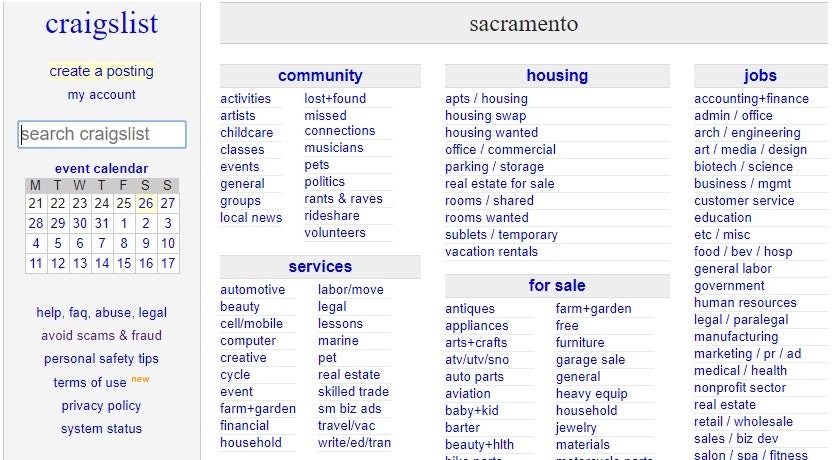
Basically just a forum, Craigslist is basic and easy to use. Started in 1995 by Craig Newmark, it was originally developed to provide information on local happenings around the San Francisco Bay Area. It is now a go-to online selling site for many individuals and even some businesses.
The downside of Craigslist is the rampant scams and the “you’re on your own” style of dealing with fraud and disputes, which makes it a higher-risk selling site.
This online selling site is best suited for those who prefer to sell locally and make deals in person. Some people take advantage of buying low and selling high on Craigslist, which can turn a pretty profit for those into market arbitrage.
12. Nextdoor
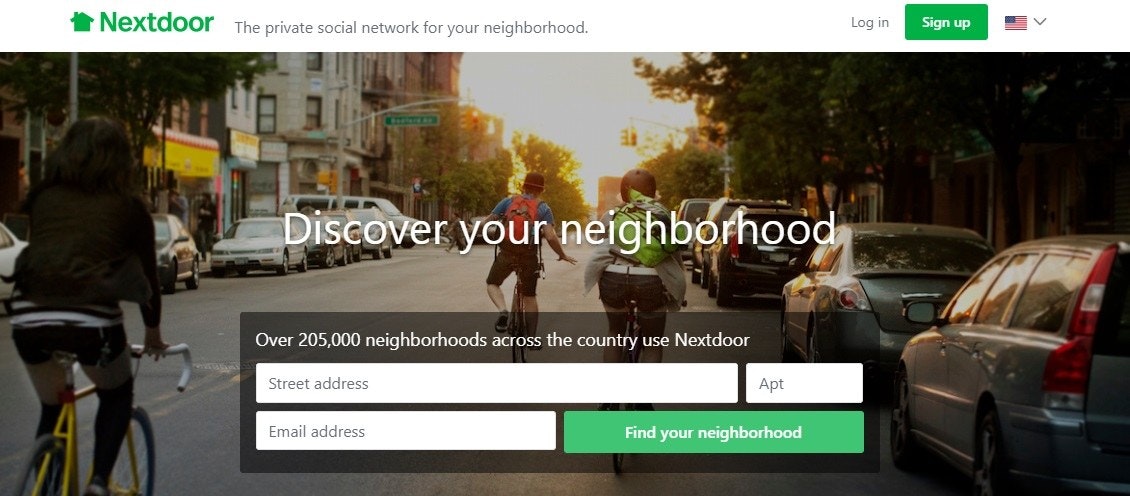
Similar to Craigslist, Nextdoor is about community. It’s a platform where neighbors can share information about what’s going on in their area—from announcing a block party to complaining about the traffic on their streets.
Beyond being a neighborhood forum, Nextdoor also provides a free forum for selling your stuff online. Like Craigslist and Facebook Marketplace, there are no listing or membership fees, but you do have to meet your buyer and make the exchange in person.
This platform feels a little safer than Craigslist, as it requires that you sign up and create an account. Because of that, it tends to be more private and have fewer scams.
Something for everybody
No matter what you’re selling or how you want to sell it, there is an online selling site that fits your needs. Whether you want to clear your cluttered home, expand your reach for your retail store, or break into the ecommerce scene with your unique brand, you’re sure to find a platform on this list that works for you.
Got a site you love to use that isn’t listed here? Let us know in the comments!
Best sites to sell stuff FAQ
What are the best sites for selling your products online?
There are many sites to sell your products online. You could consider Shopify, Handshake, Bonanza, eBay, Etsy, Facebook Marketplace, or Craigslist, to name a few.
What are the best known online clothes selling sites?
Ruby Lane, Facebook Marketplace, Nextdoor, and Etsy are known online clothes selling sites. Each varies in fees and costs, but their brands are strong and reliable.
What are the top online selling sites for individual sellers?
Handshake, Chairish, VarageSale, and Bonanza are examples of top online selling sites for individual sellers. Each has a strong community of entrepreneurs and a loyal customer base that keeps coming back for more.
[ad_2]
